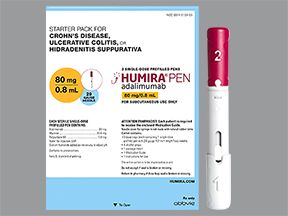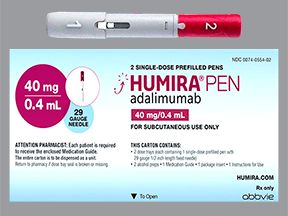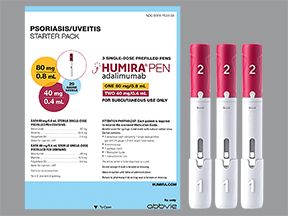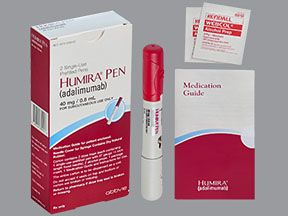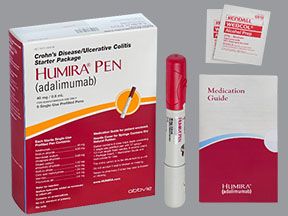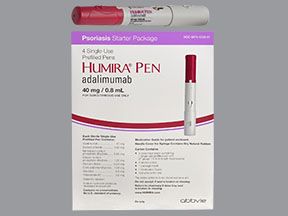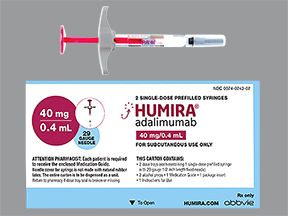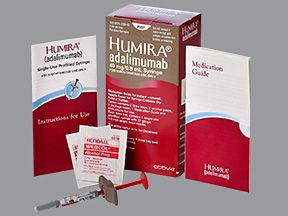Humira (adalimumab) is a prescription drug that’s used to treat certain types of arthritis or inflammation-related disease. Humira comes as a liquid solution for injection under your skin.
Humira is used to treat:
- hidradenitis suppurativa in adults and some children
- Crohn’s disease in adults and some children
- plaque psoriasis in adults
- psoriatic arthritis in adults
- ulcerative colitis in adults and some children
- rheumatoid arthritis in adults
- juvenile idiopathic arthritis in some children
- ankylosing spondylitis in adults
- uveitis in adults and some children
To learn more about Humira’s uses, see the “What is Humira used for?” section below.
Humira basics
Humira contains the active ingredient adalimumab. (An active ingredient is what makes a drug work.) Humira belongs to a group of medications called tumor necrosis factor blockers.
Humira is a biologic medication, which means it’s made from parts of living organisms.
Humira is available in a biosimilar form called Amjevita.* Biosimilars are like generic drugs. But unlike generics, which are made for nonbiologic drugs, biosimilars are made for biologic drugs.
* Other biosimilars for Humira may become available, and some are already available outside of the United States.
Like most drugs, Humira may cause mild or serious side effects. The lists below describe some of the more common side effects that Humira may cause. These lists don’t include all possible side effects.
Keep in mind that side effects of a drug can depend on:
- your age
- other health conditions you have
- other medications you may be taking
For additional information about Humira’s side effects, see this article. Your doctor or pharmacist can also tell you more about the side effects of Humira and suggest ways to help reduce symptoms.
Mild side effects
Here’s a short list of some of the mild side effects that Humira can cause. To learn about other mild side effects, talk with your doctor or pharmacist, or read Humira’s prescribing information.
Mild side effects of Humira that have been reported include:
- headache
- upper respiratory infection, such as the common cold
- rash
- injection site reaction
Mild side effects of many drugs may go away within a few days or a couple of weeks. But if they become bothersome, talk with your doctor or pharmacist.
Serious side effects
Serious side effects from Humira can occur, but they aren’t common. If you have serious side effects from Humira, call your doctor right away. But if you think you’re having a medical emergency, call 911 or your local emergency number.
Serious side effects of Humira that have been reported include:
- hepatitis B reactivation (a flare-up of the infection if it’s already in your body)
- tuberculosis reactivation
- heart failure
- lupus-like syndrome
- nerve disorders, such as seizures or multiple sclerosis
- blood disorders, such as anemia (low red blood cell level)
- liver damage
- psoriasis (in people using Humira for conditions other than plaque psoriasis)
- boxed warnings:*
- risk of serious infections, including tuberculosis, fungal infections, and bacterial sepsis
- allergic reaction†
* For more information, see the “What should be considered before taking Humira?” section.
† To learn more about this side effect, see the “Allergic reaction” section below.
Allergic reactionSome people may have an allergic reaction to Humira.
Additionally, if you have a latex allergy, be careful when touching the needle cap of Humira pens and prefilled syringes. These caps contain natural rubber latex. Be sure to tell your doctor if you have a latex allergy before using Humira.
Symptoms of a mild allergic reaction can include:
A more severe allergic reaction is rare but possible. Symptoms of a severe allergic reaction can include swelling under your skin, typically in your eyelids, lips, hands, or feet. They can also include swelling of your tongue, mouth, or throat, which can cause trouble breathing.
Call your doctor right away if you have an allergic reaction to Humira. But if you think you’re having a medical emergency, call 911 or your local emergency number.
If you have a certain type of arthritis or a disease related to inflammation, your doctor may prescribe Humira for you.
It’s a prescription drug that’s used in certain situations to treat the following conditions:
- Hidradenitis suppurativa (HS). Humira is used to treat moderate to severe HS in people ages 12 years and older. HS is a skin condition that causes sores on your underarm (axilla) or groin, around your anus, between your anus and urethra, and under your breasts.
- Crohn’s disease (CD). Humira is used to treat moderate to severe CD in adults and children ages 6 years and older. CD is an inflammatory disease that causes swelling in your intestines.
- Plaque psoriasis (PsO). Humira is used to treat moderate to severe PsO in adults. With PsO, you may have plaques on the skin of your scalp or trunk, or the skin around your joints. (Plaques are rough, thick, or scaly patches.) Some people with PsO develop psoriatic arthritis (PsA), which is described just below.
- Psoriatic arthritis (PsA). Humira is used to treat PsA in adults. The drug helps to slow the worsening of this condition. With PsA, you have inflammation in your joints, and you may also have plaques on your skin, similar to those seen with PsO. (PsO is described directly above.)
- Ulcerative colitis (UC). Humira is used to treat moderate to severe UC in adults and children ages 5 years and older. With UC, you have swelling in your lower intestine.
- Rheumatoid arthritis (RA). Humira is used to treat RA in adults. The drug can help slow the worsening of this condition. With RA, you have inflammation in your joints. But you may also have problems with other organs in your body.
- Juvenile idiopathic arthritis (JIA). Humira is used to treat moderate to severe JIA in children ages 2 years and older. JIA is a type of arthritis that occurs in children.
- Ankylosing spondylitis (AS). Humira is used to treat AS in adults. AS and RA are very similar diseases. But people with AS usually have long-lasting lower back pain. This is unlike people with RA, who usually have long-lasting pain in joints in their hands, wrists, or knees.
- Uveitis. Humira is used to treat uveitis in adults and children ages 2 years and older. With uveitis, you have inflammation in your eyes that can cause pain and vision loss.
Adalimumab, the active drug in Humira, targets a protein in your body called tumor necrosis factor (TNF). The drug blocks this protein from attaching to its receptors (binding sites).
People with inflammatory diseases such as RA or PsA may have too much TNF in their joints. And having too much TNF can lead to inflammation in your body. Blocking TNF is how Humira works for the conditions listed above.
Whether you have health insurance or not, cost may be a factor when you’re considering Humira. What you’ll pay for Humira may depend on several things, such as your treatment plan and the pharmacy you use.
Here are a few things to consider regarding cost:
- Cost information and savings coupons. You can visit the Optum Perks site,* such as this webpage, to get price estimates of what you’d pay for Humira when using coupons from the site.
- Generic or biosimilar form. Humira is available as the biosimilar drug Amjevita.† Similar to generic drugs, biosimilars often cost less than brand-name drugs. (Biosimilars are like generics. But unlike generics, which are made for nonbiologic drugs, biosimilars are made for biologic drugs such as Humalog.) Talk with your doctor if you’d like to know whether Amjevita could be an option or you.
- Savings options. If you have questions about how to pay for your prescription, talk with your doctor or pharmacist. The Humira manufacturer’s website may also have some savings options.
For more information about Humira and cost, see this article. You can also check out this article to learn more about saving money on prescriptions.
* Optum Perks is a sister site of Healthline. Optum Perks coupons cannot be used with any insurance copays or benefits.
† Other biosimilars for Humira may become available, and some are already available outside of the United States.
Your doctor will recommend the dosage of Humira that’s right for you. Below are commonly used dosages, but always take the dosage your doctor prescribes.
Forms and strengths
Humira is a liquid solution for injection under your skin. This solution comes in prefilled pens, prefilled syringes, and vials. (The vials are only available for use by healthcare professionals.) Each pen, syringe, and vial contains a single dose of Humira.
The strength of Humira varies depending on which form your doctor prescribes, as listed in the table below. The strengths are given in milligrams per milliliter of solution (mg/mL).
| Humira form | Prefilled pen | Prefilled syringe | Vial |
| Strength | • 40 mg/0.4 mL • 40 mg/0.8 mL • 80 mg/0.8 mL | • 10 mg/0.1 mL • 10 mg/0.2 mL • 20 mg/0.2 mL • 20 mg/0.4 mL • 40 mg/0.4 mL • 40 mg/0.8 mL • 80 mg/0.8 mL | 40 mg/0.8 mL |
Recommended dosages
The dose of Humira your doctor recommends and how often you’ll take it depends on the condition it’s prescribed to treat. For some conditions, you may need to inject a loading dose of the drug. A loading dose is a dose that’s larger than your regular dose. It allows the drug to start working quickly in your body.
To learn more about Humira’s dosages, see this article.
How to take
You’ll inject Humira under your skin. Your doctor will show you how to give Humira injections to yourself. Be sure to let your doctor know if you have any questions or concerns about administering the drug to yourself.
You’ll inject Humira under the skin of:
- your belly, staying 2 inches away from your belly button
- the front of your thighs
Every time you inject a dose of Humira, you should choose a different injection site. And each new injection should be given at least 1 inch away from your last injection site.
You should avoid injecting Humira into skin that’s:
- sore
- bruised
- discolored
- hard
- scarred, including having stretch marks
Questions about taking Humira
Here are answers to some common questions about taking Humira.
- What if I miss a dose of Humira? If you miss a dose of Humira, take the missed dose as soon as you remember. Then continue taking Humira doses at your regularly scheduled times. How many days late you can take a Humira dose depends on when your next dose is scheduled. So if it’s close to when your next dose is due, just skip the missed dose. If you’re unsure of when to take a missed dose of Humira, talk with your doctor or pharmacist.
- Will I need to use Humira long term? You’ll likely need to take Humira long term. This is because most of the conditions Humira treats are long lasting. Talk with your doctor about how long you’ll need to take Humira.
- Should I take Humira with food? You don’t have to. How well your body absorbs Humira doesn’t depend on whether you have a full or empty stomach.
- How long does Humira take to work? Depending on the reason you’re taking Humira, it may take several months for the drug to work. For example, in studies, people with rheumatoid arthritis saw improvement in their condition after 6 months of treatment. And this improvement was maintained after 1 year when treatment was continued. You might notice Humira working sooner than this for your condition. Talk with your doctor to find out when you should expect to experience a reduction in your symptoms.
Overdose
Don’t take more Humira than your doctor prescribes. Using more than this can lead to serious side effects.
What to do in case you take too much Humira
If you’ve injected too much Humira, talk with your doctor immediately. They may want to monitor you for signs and symptoms of overdose.
You can also call 800-222-1222 to reach America’s Poison Centers, or use its online resource. But if you have severe symptoms, immediately call 911 (or your local emergency number) or go to the nearest emergency room.
Find answers to some commonly asked questions about Humira.
Does Humira cause weight gain or weight loss?
No, Humira doesn’t cause weight gain or weight loss. But if you get a serious infection during Humira treatment, you might lose weight. And serious infections are a possible side effect of this drug.
Also, new or worsening heart failure can cause a rapid increase in weight. Heart failure is a possible side effect of Humira.
If you have unexplained weight gain or weight loss when using Humira, tell your doctor. They can try to determine what might be causing your weight change.
If you’re concerned about any other weight changes while you’re taking Humira, talk with your doctor. They can provide tips to help you manage a body weight that’s healthy for you.
Will I have hair loss with Humira?
Possibly. Hair loss wasn’t reported as a side effect in Humira’s studies. But there have been reports of hair loss in people taking Humira since the drug was approved.
If you notice you’re losing hair while you’re taking Humira, talk with your doctor.
What will happen if I stop taking Humira? Will I have withdrawal symptoms?
If you stop taking Humira, the symptoms of your condition may come back. But you won’t have withdrawal symptoms from the medication itself. (Withdrawal refers to symptoms that can happen if you stop taking a medication that your body is dependent on. Dependence means the body needs the medication to function like usual.)
If you need to stop taking Humira, your doctor will closely monitor you for symptoms of your condition. If your symptoms return, your doctor may recommend that you restart treatment with Humira. Or they may suggest another drug to manage your condition.
Other drugs may be available that can treat your condition. If you’d like to explore an alternative to Humira, talk with your doctor. They can tell you about other medications that might work well for you.
The following drugs are similar to Humira:
- etanercept (Enbrel)
- infliximab (Remicade)
- ustekinumab (Stelara)
- secukinumab (Cosentyx)
- vedolizumab (Entyvio)
- upadacitinib (Rinvoq)
- certolizumab (Cimzia)
- risankizumab-rzaa* (Skyrizi)
- tofacitinib (Xeljanz)
* The reason “-rzaa” appears at the end of the drug’s name is to show that the drug is distinct from similar medications that may be created in the future.
For information about how some of these alternatives compare with Humira, see these articles:
Below is important information you should consider before using Humira.
Interactions
Taking a drug with certain medications, vaccines, foods, and other things can affect how the drug works. These effects are called interactions.
Humira can interact with several other medications. Before taking Humira, talk with your doctor and pharmacist. Tell them about all prescription, over-the-counter, and other drugs you take. Also tell them about any vitamins, herbs, and supplements you use. Sharing this information can help you avoid potential interactions.
The sections below give an overview of Humira’s interactions. To learn more about the interactions of this drug, see this article or talk with your doctor or pharmacist.
Drug interactions
Below is a list of medications that can interact with Humira. This list does not contain all drugs that may interact with Humira. If you have questions about drug interactions that may affect you, ask your doctor or pharmacist.
| Drug group or drug name | Drug examples |
| biologic disease-modifying antirheumatic drugs | • abatacept (Orencia) • anakinra (Kineret) |
| other tumor necrosis factor blockers | • infliximab (Remicade) • etanercept (Enbrel) • certolizumab (Cimzia) • golimumab (Simponi) |
| certain drugs that require close monitoring of their dosages | • warfarin (Jantoven) • cyclosporine (Neoral) • theophylline (Theo-24) |
| the antibody drug rituximab (Rituxan) | — |
Other interactions
Humira can also interact with other substances, such as:
- Alcohol. Alcohol is not known to interact with Humira. But alcohol may worsen symptoms of conditions Humira is used to treat. If you have questions about consuming alcohol while taking Humira, talk with your doctor.
- Vaccines. You should not receive live vaccines while you’re taking Humira. (Live vaccines contain live strains of the bacteria or virus that they’re meant to protect you from.) This is because getting a live vaccine while you’re using Humira increases your risk for infection. Examples of live vaccines include measles, mumps, rubella (the MMR vaccine), rotavirus, and chickenpox. If you need to receive a vaccine, talk with your doctor first to make sure it’s safe for you.
Pregnancy and breastfeeding
Adalimumab, the active ingredient in Humira, passes through the placenta to the developing fetus during the last trimester of pregnancy. But studies don’t show a link between Humira use and development problems in pregnancy.
It’s thought that having unmanaged rheumatoid arthritis or inflammatory bowel disease such as Crohn’s disease can negatively affect pregnancy. And keep in mind that Humira is used for those conditions.
Also, because of how Humira works, doctors will weigh the benefits and risks of giving certain vaccines to babies exposed to Humira during the last trimester of pregnancy.
If you’re pregnant or considering pregnancy, talk with your doctor before starting Humira.
Humira does pass into breast milk. But side effects from Humira in children who are breastfed haven’t been reported. Also, Humira doesn’t seem to decrease milk production in people who are breastfeeding.
If you’re breastfeeding, your doctor will weigh the benefits and risks of Humira treatment. Be sure and talk with your doctor if you’ll be breastfeeding while taking Humira.
Boxed warnings
Humira has
Risk of serious infections. Taking Humira can increase your risk for getting a serious infection. This includes tuberculosis, fungal infections, and other rare infections. It may also include bacterial sepsis (a life threatening illness that can result from an infection).
Symptoms of a serious infection will vary, but they may include:
- breathing quickly
- fast heart rate
- being confused or disoriented
- fever
- chills
- rash
- cough
If you develop a serious infection or sepsis while you’re taking Humira, your doctor will have you stop taking the drug. Call your doctor right away if you have any symptoms of infection while using this drug.
Your doctor will also check you for tuberculosis before you start using Humira. And during treatment with Humira, your doctor will monitor you for any signs or symptoms of tuberculosis.
Risk of cancer. Some children and adolescents have developed certain types of cancer when taking Humira, such as lymphoma. (This is a type of cancer that affects the lymphatic system.) Other cancers that can be fatal were also reported.
Before prescribing Humira, your doctor will consider the benefits and risks of using this drug if you already have cancer. If you develop cancer while you’re taking Humira, your doctor will also weigh the benefits and risks of Humira treatment. Your doctor may recommend that you stop taking Humira.
Other warnings
Humira can sometimes cause harmful effects in people who have certain conditions. This is known as a drug-condition interaction. Other factors may also affect whether Humira is a good treatment option for you.
Talk with your doctor about your health history before you take Humira. Be sure to tell them if any of the following factors apply to you:
- history or risk of hepatitis B
- history of tuberculosis
- previous allergic reaction to Humira or its ingredients, or to latex (which is used on some Humira pen covers)
- nervous system problems
- low blood cell counts
- heart failure
- lupus-like symptoms
- liver problems
If you have questions about taking Humira, talk with your doctor or pharmacist. Questions you may want to ask include:
- How should I store Humira at home?
- To help prevent illness, should I stop taking Humira during flu season?
- Will Humira cure my condition?
- How should I dispose of empty Humira pens?
- While using Humira, should I get yearly flu vaccines?
To learn more about Humira, see these articles:
- Humira Dosage Information
- Side Effects of Humira: What You Need to Know
- Humira and Cost: What You Need to Know
To get information on different conditions and tips for improving your health, subscribe to any of Healthline’s newsletters. You may also want to check out the online communities at Bezzy. It’s a place where people with certain conditions can find support and connect with others.
Disclaimer: Healthline has made every effort to make certain that all information is factually correct, comprehensive, and up to date. However, this article should not be used as a substitute for the knowledge and expertise of a licensed healthcare professional. You should always consult your doctor or another healthcare professional before taking any medication. The drug information contained herein is subject to change and is not intended to cover all possible uses, directions, precautions, warnings, drug interactions, allergic reactions, or adverse effects. The absence of warnings or other information for a given drug does not indicate that the drug or drug combination is safe, effective, or appropriate for all patients or all specific uses.

